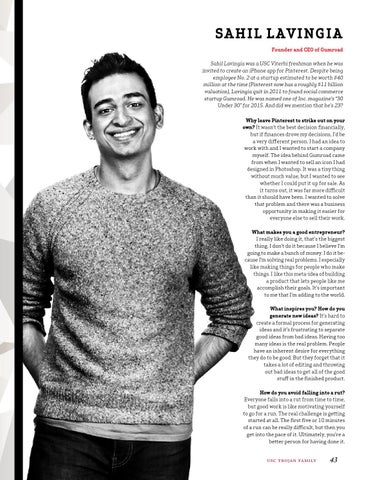SA H I L LAV I NG IA Founder and CEO of Gumroad Sahil Lavingia was a USC Viterbi freshman when he was invited to create an iPhone app for Pinterest. Despite being employee No. 2 at a startup estimated to be worth $40 million at the time (Pinterest now has a roughly $11 billion valuation), Lavingia quit in 2011 to found social commerce startup Gumroad. He was named one of Inc. magazine’s “30 Under 30” for 2015. And did we mention that he’s 23? Why leave Pinterest to strike out on your own? It wasn’t the best decision financially, but if finances drove my decisions, I’d be a very different person. I had an idea to work with and I wanted to start a company myself. The idea behind Gumroad came from when I wanted to sell an icon I had designed in Photoshop. It was a tiny thing without much value, but I wanted to see whether I could put it up for sale. As it turns out, it was far more difficult than it should have been. I wanted to solve that problem and there was a business opportunity in making it easier for everyone else to sell their work. What makes you a good entrepreneur? I really like doing it, that’s the biggest thing. I don’t do it because I believe I’m going to make a bunch of money. I do it because I’m solving real problems. I especially like making things for people who make things. I like this meta-idea of building a product that lets people like me accomplish their goals. It’s important to me that I’m adding to the world. What inspires you? How do you generate new ideas? It’s hard to create a formal process for generating ideas and it’s frustrating to separate good ideas from bad ideas. Having too many ideas is the real problem. People have an inherent desire for everything they do to be good. But they forget that it takes a lot of editing and throwing out bad ideas to get all of the good stuff in the finished product. How do you avoid falling into a rut? Everyone falls into a rut from time to time, but good work is like motivating yourself to go for a run. The real challenge is getting started at all. The first five or 10 minutes of a run can be really difficult, but then you get into the pace of it. Ultimately, you’re a better person for having done it.
tfm.usc.edu
usc trojan family
43
